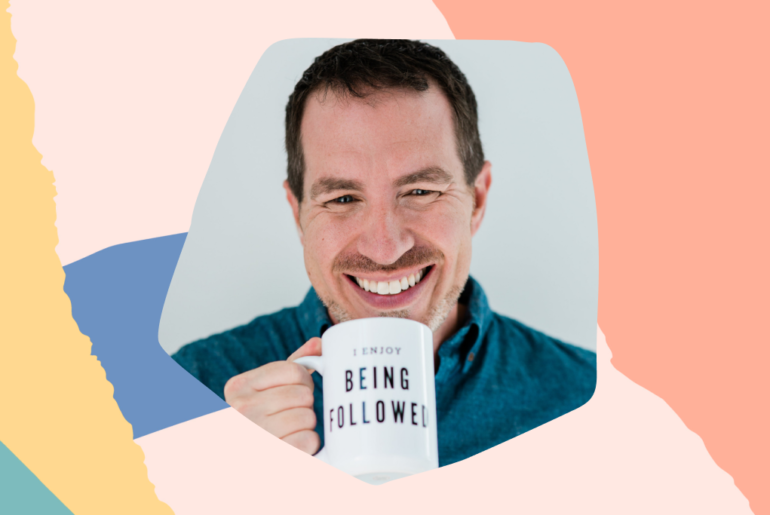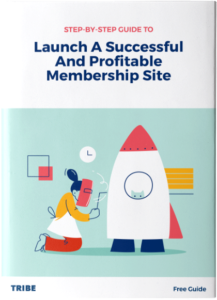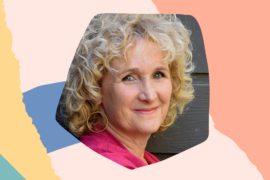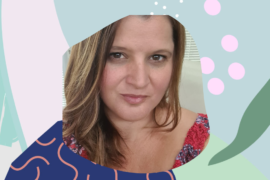Jerry Potter and his wife were radio presenters, personalities, and programmers who hosted a show together for 15 years. But shortly before his 40th birthday, they were both laid off, losing their salary and benefits while needing to provide for two young children. A friend told him about the world of social media consulting and he soon fell in love with the industry.
Now, at Five Minute Social Academy, Jerry helps businesses create profitable social media strategies without big teams, big budgets, or feeling the need to post every day.
Today, Jerry joins the podcast to share the story of how he rebounded after suddenly losing his career, used his existing skills to become a new kind of content creator, and how social media has changed the landscape for consumers and marketers alike.
Key Takeaways
- How Jerry built a following of 10,000 subscribers on YouTube within a year – and the question that helped him turn the work he was doing for free into a business.
- Why the membership model allows Jerry to get his creative juices flowing without dealing with the corporate politics of his previous career.
- The unbelievable benefits of operating virtual business.
- Why social media provides a once-in-a-lifetime platform and opportunity.
Free Give
FREE Guide – Launch & Grow a Profitable Membership Site
Ready to reclaim your time and attract more monthly paying customers? Our step-by-step guide will show you how to build a membership site that turns your passion into recurring profit. Click here to download!
Memorable Quote
- “There are hard moments about it, obviously with any job, you’re working for somebody or you’re working for yourself, but when you’re doing what you love, those hard moments are easy within the heart.” – Jerry Potter
- “Social media really is in some ways your opportunity to scale humanity and that is where the connection is from.” – Shelli Varela
Episode Resources
- Five Minute Social Academy
- Five Minute Social Media
- Five Minute Social Media on YouTube
- The 4-Hour Workweek: Escape 9-5, Live Anywhere, and Join the New Rich
Transcript
Read The Transcript
Shelli Varela: Jerry Potter, welcome to the It’s a TRIBE Thing Podcast, buddy. How are you doing?
Jerry Potter: Thank you, Shelli. Really good. I’ve been listening for a long time. So, it’s really an honor to actually be here and chatting with you now.
Shelli Varela: I’m so stoked. So, how do you like the podcast so far?
Jerry Potter: It’s an amazing 10 seconds.
Shelli Varela: Awesome. I’m really excited to tell your story because it would be a grotesque understatement to say that it’s a shot of inspiration for all of our listeners, those who are hearing about memberships for the first time, those who are starting membership sites, and those who have membership sites that they’re growing. So, without further ado, would you mind sharing with us who were you before you were a membership site owner and what led you to that?
Jerry Potter: Yeah, absolutely. And I’ll say I have always referred to myself as the world’s most unlikely entrepreneur and I know there’s an official contest but there are definitely things along the way that I never would have expected me to be sitting here doing this right now. But the membership journey for me started and my wife and I actually worked together in radio as radio personalities and presenters, and I also worked in programming, choosing the music and stuff like that for I was in radio for over 20 years, and we hosted a show together for 15 years. Not for everybody but we were able to get along at work and at home and the only difference was we would get to dinner and it would be like, “So, tell me about your day. Oh, yeah, you were there. You already know everything.” So, we got comfortable with silence sometimes but it really was great because we got to have a fun job with our best friends and it was one of those things where that’s all I’d ever known. I went to a high school that had a radio station. I got right into it other than painting houses in college to help pay the tuition. I’ve never done anything else.
So, it was a few months before my 40th birthday and we had just booked a trip to Japan. I was actually born in Tokyo and my family left when we were four, and I’ve never been back. And so, we had planned this trip. We booked it out. It was going to be 10 days. And the next morning, we got called into our boss’s office and told we were no longer needed and the two of us with two young kids were laid off, all the salary gone, all of the health insurance, benefits, everything was just immediately gone. And it was St. Patrick’s Day so I always remember it was that day. And it was one of those things where radio is a volatile business and it happens and a lot of times it’s out of your control. But we went home that day and it was like, “Okay. Now what?” And people will usually then look for a new job, pick up, and move to a new city but we were back in our hometown of Seattle. We had two young kids. We didn’t want to drag them all over the place for the sake of our careers anymore. It was fun for us to move around when it was just us and so we decided we were staying in Seattle.
I remember even having a conversation with another radio friend at the time and I said, “Look, I’ll work at McDonald’s if I have to, to stay here.” And he’s like, “Okay. You let me know when you’re working at McDonald’s, what that’s like,” but we were so set on staying so tried to get other local jobs in radio but that was tough. And so, I started looking like, “What else am I good at? This is all I’ve ever known.” And another friend of mine that had been in radio said, “Well, why not social media?” And I’m like, “Why would I do that?” And he goes, “I was out of work for a year and I got a phone company to hire me to do social media. They paid me more than I made in radio.” And I just went in and played on Twitter all day and it was one of those things.
Shelli Varela: Like, “What? That’s a thing?”
Jerry Potter: Right. That’s, “Okay. Let me look into that.” And so, I was determined to do something that I enjoyed. I didn’t want to end up working, for example, at a restaurant. And I found this job ad on Craigslist and it said, “We’re looking for a social media assistant. It was part-time.” Just to set the stage, I had just been accepted to drive for Uber and Lyft. So, I was ready to start driving for them that week because I didn’t want to move and I couldn’t find anything else. And I replied to this ad and it was a little sketchy-looking and they asked to meet at a Starbucks and I’m on the way. I got this text from them and said, “Hey, Starbucks is too crowded. Let’s meet at our office. Here’s the address.” And I was on the phone with a friend at the time and he said, “Oh, no. They just changed the location at the last minute. These people are going to murder you. You can’t go to this job interview.”
Shelli Varela: Not very encouraging.
Jerry Potter: Right. And I was like, “No, I’m sure it’ll be fine.” Sure enough, it was in this little, tiny office but we clicked and it was a startup agency and they hired me and they created a position for me because it was supposed to be this part-time thing. I feel like if you believe in fate, that was fate happening. They asked me at the time to sign a document, a contract that said if I leave I will not start a competing agency for a full year. And I laughed and I said, “I’m never going to have my own business. I will gladly sign a 10-year version of this if you want.” They said, “No. One year is fine.” And so, off we went and I loved working with businesses and thinking about how people can be reached using social media, and I just dove in. It was so much fun and after that, I wanted to do something more. And so, then I started a YouTube channel called Five Minute Social Media. This is where this all began. And for anyone not familiar, YouTube is a long, slow grow for most people, including me. But I said, “I’m going to do this for a year. It’s just a hobby. It’s fun. We’ll see what happens.”
And I remember sitting there three months in, four months in, wanting to quit because it was a lot of work and I, remember, had two young kids. My wife had started working again at the time and she worked evenings. So, in the evenings, it was just me, single dad, picking up the kids, getting dinner ready, doing the whole thing. I wanted to quit so many times but I gave myself that one-year commitment. After six months, I hit 100 subscribers and after seven months, I was at 1,000 subscribers, and a year later, I was at 10,000 subscribers. All of a sudden, it was like, okay, maybe this is fun, right? It feels good. And I still had no plans to have any sort of business but two things happened that made me go, “Okay. This needs to be something more. One, my wife was just saying things like, “Alright. So, you’re spending five hours every Saturday answering people’s questions and you’re not making any money for this, right? So, that’s family time that you’re taking away to answer these questions?” And I’m like, “Well, I’m helping them.”
Shelli Varela: It’s always funny when someone echoes a brilliant question to you and you’re like, “Hm, you make a good point.”
Jerry Potter: Yes. It was a very good point. Yeah. I can never argue against the family argument, right? And then this other guy reached out to me on LinkedIn. He said, “Hey, I’m a sales trainer. I love your videos. Can I use them this one or these couple?” And I said, “Yeah, sure.” And he said, “So, you must be making a fortune at this? How are you making money at this?” And there was this long, awkward pause and I went, “I am not really making any money yet.” He said, “What do you mean you’re not making any money?” I was like, “Well, how should I make money?” I mean, literally no clue. I just was helping people and it was fun. And he said, “You should have a membership.” I was like, “What do you mean a membership?” He goes, “It’s like a gym. People pay you every month and they get help from you and you just charge them every month, and then that becomes your business.” And it was one of those things where it was like that was that lightbulb moment. I had never heard of It’s a TRIBE Thing or any of these things and it was just like, “That’s a thing? Okay.” And that was kind of the point where it kicked in.
I later heard of TRIBE and TRIBE was the way to learn how to build a membership site and I just said, “Great. I’m in.” Signed up for TRIBE and shortly thereafter, launched my first membership, which was called FMSM Pro, which FMSM is Five Minute Social Media, and did a beta launch and got 44 members from three emails. And it was like, “Oh, my gosh, this really is a thing. Wow.”
Shelli Varela: That’s amazing. So, I want to circle back on a couple of things because your story is inspirational on a number of levels. But I’m curious, before we get into that, what was it about radio that you first love that brought you to it? Because I know many of our listeners are practicing, some are more experienced and some are learning to practice, “Is this something that’s a yes for me? Is this something that is interesting to me? And where do my gifts come from?” So, if you chase the route all the way back, “I’m interested,” for you, what was it about radio? Because really you’ve been doing something similar the whole time. You’ve been creating content and you’ve been doing social media even with what you were doing before. So, what was it about that, that you first loved that you came back to when it came to starting a membership site?
Jerry Potter: I love that you asked that question because it took me a while to figure out that answer. The first thing I noticed is what I didn’t like about radio when it went away, which was the corporate side of it, the daily pressure of putting on a show every day, my identity, and my self-esteem, partially being tied to whether or not people liked the radio show versus who I was as a human. And so, those were the first things that became apparent, but after a while, like you mentioned, I realized, “Here I am. I am getting to be creative. I’m creating content.” One of the things in radio that was so important and we didn’t refer to it at the time but essentially what I was was an engagement specialist. I was creating content that got people to engage and call the show or text or go to the website or enter a contest or all these things. And after I’d kind of pivoted to social media, I realized I’m doing the exact same thing. And I was fortunate because all kinds of people needed that, all of a sudden, and I had this specialty that I had no idea that that was even a thing. So, it really was, it was the content creation and then the specializing engagement.
But the other piece is and I think this is true for a lot of us, even I consider myself an introvert, it doesn’t always come out that way but life is all about people. And so, in radio, it was about the listeners and meeting the listeners and them calling into the show and then feeling like we were friends with them and actually becoming friends with some of them and all of that. And social media was this thing that leveled the playing field so we can all have those relationships even without a 100,000-watt radio transmitter. And so, yeah, it very quickly became clear after a while. I shouldn’t say quick. After a while, it quickly became clear that it’s about the people and the engagement, and still getting to be creative.
Shelli Varela: Well, I just love the lessons that are peppered throughout this chat because when you pay attention to the thing you love that you don’t need validation for, the thing that you just keep getting up for, and it was great that you contrast it like, “This is what I loved about radio and this is what I didn’t.” And no surprise whatsoever that the part that you loved was the part that you continued doing when you were talking about being an engagement specialist. Very few people I know of can do a YouTube channel for a year for fun but to your point, it’s kind of like, “Well, that’s kind of what you did. That’s what you loved.” And it’s just paying attention to what the through-line is for you. So, what is the best part about having a membership site now that you didn’t see coming when you first started it?
Jerry Potter: I think the best part for me has just been the lifestyle design, that’s part of it, and having essentially in my membership is all online and it’s virtual. One of my favorite books is The 4-Hour Workweek from Tim Ferriss and a lot of people say that book’s a gimmick or it’s about online marketing, but for me, it was about lifestyle design. And it was completely life-changing for me because it was the first time I had stopped thinking you work until you retire, and then you “start enjoying life” and not that life was miserable before. And so, the ability for my family and I to be able to be anywhere and I can still work and serve my people at the highest capacity, that’s been this unbelievable benefit. And it’s funny that it didn’t even click until somebody else reached out to me who happens to have a membership herself, and said, “Hey, can I interview you for my membership?” And I said, “Sure. I love talking about what I do.” And when I got on, I thought we were going to talk about social media and she said, “No. I want to talk to you about having a location-independent business and how you built that.” And it’s not that I didn’t realize that, but it was like, “Oh, I do have that. What do you know?”
Maybe I missed the obvious. As I’m telling you these stories, Shelli, I feel like there have been these things looking back, they seem so obvious, but I was deep in whatever I was doing and they weren’t there until somebody went, “Hey, you should start a membership site,” or, “Hey, you have a location-independent business.”
Shelli Varela: For sure. What advice would you give people who, I mean, I always say not all gifts come wrapped in a bow. And so, when you were called into your boss’s office with your wife on St. Patrick’s Day and said, “Hey, by the way, pack your stuff. Your services are no longer required,” I can only imagine a degree of devastation and fear and what am I going to do now? So, for anybody else who’s listening and sitting on the precipice of something that looks anything like that, what advice would you give them in terms of following their dreams and following their yes, and following their through-line and the parts that are what they “love about radio” whatever their version of radio is?
Jerry Potter: I’m a big dreamer but I’m also very much a realist. My wife and I actually worked really well together because she was this creative force where it was like come up with the crazy idea and worry about whether we have to get permission from the police later kind of thing if we were planning something for the radio or anything like that, and I am very much like, “Okay. Now, hang on. Let’s think this through. I think everything through.” So, it’s interesting that I’ve landed in this place but I think the great thing about the internet and obviously social media as well is that we can literally reach anyone anywhere in the world. And so, it’s possible for just about anybody to do something you love and earn a living at it. And I’ll tell you, I truly love what I do so much that if I won some big lottery, I would still do this on some level. I can’t imagine just checking out because, like you said, it’s the reason that I get up every day. When I first started it and it was just part-time income on the side, it was still fun but there were a lot of late nights. I had young kids, like I mentioned, my wife worked evenings and so basically was after the kids went to bed is when I built my YouTube channel.
And so, it was me from eight o’clock, I think, was their bedtime at the time until 11:00, 11:15, 11:30, whenever I got tired, and then I would get going on working all that stuff and trying to make it come true. So, the biggest advice, though, I think that I would give is that find the simplest version of what you want to go after and really do it well. I think sometimes we self-sabotage because we think we have to do all the things and so we try to and we don’t do any of them well, and I absolutely did this. The second piece is you just have to get started. Had I not started my first membership just to start finding out what people needed and wanted, I never would be where I am today. And so, with my YouTube channel, I redid my first three videos for three months before I finally put them out there. The only reason I put them out is because I was speaking at a conference and I wanted to plug it at this conference. And nobody saw those first videos on YouTube. Like, I put them out and then a week later, it was like, “Oh, eight views? Wow. I sure obsessed over this for nothing.” And so, when it came to launch the membership, I just said, “Hey, I’m doing it, who wants to join?” And then people raise their hand and then I built the whole thing in two weeks, and it was so much more effective that way.
Shelli Varela: Yeah. Well, there’s something to be said for consistency too. One of the things that I love that you do in your membership site, but also with social media as a whole is allow people to be seen and to be heard. And so, for the coaches, other speakers, entrepreneurs that are listening right now, can you explain the value that social media provides when you do it properly for them to not just have their content out there, but actually have people see them and hear them and understand them and connect with them?
Jerry Potter: I do an update every month for my members and it’s called What’s Working Now In Social Media and I basically go through like three things each month and these aren’t like new features or shiny objects. It’s like, “Hey, here’s the stuff that’s really working right now.” And one of the big things and I probably have talked about this almost every month for the last year is being authentic and being who you are, like we are past the day and age of corporations being these personality-less, I realized that’s not a word, entities where nobody knows what they are. And I don’t know if, you know, the internet certainly and social media certainly brought us into the age of authenticity and being genuine and we certainly heard lots about that in the online marketing space. But then Millennials are the first generation to come along and say,
“I will buy an inferior product or I will join an inferior membership from somebody who has the same values as me,” or, “I will pay more for a product than I need to because this company or this membership, or whatever has the same values as me.”
And then with the pandemic, all the things that came out of that, the equality movement and people reprioritizing their lives, we have just gotten to this phase where we connect with companies in the same way that we connect with people. And social media is the chance to turn you or your brand into a personality. I think that’s the great opportunity for social media. There’s too much time where people are getting caught up in the I have to post three times a week, I have to be on TikTok because it’s the hot thing right now, or I have to get on Clubhouse or whatever it might be instead of just stepping back and, as I mentioned before, with getting your membership going, picking a couple of things, and doing them really, really well and putting yourself out there in a way and obviously, Shelli, you’re all about storytelling so this is nothing new for you. But people are attracted to our stories and who we are. They are not attracted to our rented Lamborghinis and our perfectly polished photos, and all of that kind of stuff. And so, if you are an author or a speaker or even just some of the people in my membership, I’ve got a guy who has a traveling zoo and I have people that help other people with their marketers and I’ve got a consultant who helps companies detoxify their workplaces, and speakers and coaches and all these different things, and they’re all making such an impact in the world because they figured out how to put their story out there and get heard. And social media gives us that opportunity like nothing ever in throughout history.
Shelli Varela: Well, you made a really beautiful point about authenticity. And I know for those people who think they’re looking at their competition and thinking, “Well, why are they getting featured in places or why are people listening to them and maybe not me?” It really does come down to authenticity. And the truth is the grittier and the raw and the more real, the more connective. And social media really is in some ways your opportunity to scale humanity and that is where the connection is from. People don’t follow you like if people feel your story, they will follow you but if people can’t feel you, people won’t follow you. So, thank you so much for sharing this brilliant story. It’s inspiring and uplifting on a number of levels, particularly for anybody going through any shred of doubt or fear or hardship, or the loss of a job or whatever that looks like. So, thank you for providing hope. Thank you for providing direction. And if people are looking for you online, where’s the best place they can find you?
Jerry Potter: You can start at my website, which is FiveMinuteSocialMedia.com spelled out F-I-V-E. And if you want to look up the YouTube channel where it all started, we’ve recently grown past 100,000 subscribers, which I’m completely humbled and floored by so if you search Five Minute Social Media on YouTube, it should come right up.
Shelli Varela: That’s amazing. Thanks so much for stopping by, buddy. Appreciate you.
Jerry Potter: My pleasure, Shelli. Thank you so much for having me.
[END]
To learn more and get access to all episodes, visit our podcast page!






